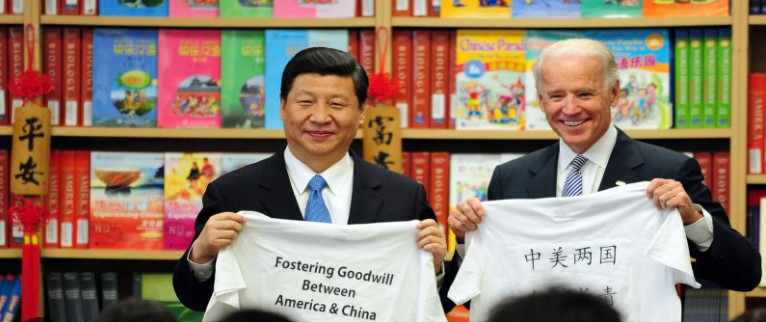Virendra Pandit
New Delhi: As the Russian invasion of Ukraine enters its ninth month next week, and the US tries to sprinkle some cold water on China’s ambition to ‘reunite’ with Taiwan, Presidents Joe Biden and Xi Jinping shook hands in Bali, Indonesia, on Monday, ahead of the Group of 20 (G20) Summit, voicing hope that the two countries could manage growing differences and avoid conflict.
Leaders of the world’s two largest economies met for the first time after over three years as, post-pandemic, the planet hurtles toward a possible population and climate collapse, fuel, food, and financial crises in the coming months and years, and a global recession, amid multiple wars taking shape on various continents.
Although he is engaging Xi, President Biden refused since the invasion of Ukraine to deal directly with Russian President Vladimir Putin, who is conspicuously absent from the Bali summit. The Kremlin cited scheduling issues and instead sent longtime Russian Foreign Minister Sergei Lavrov, who arrived in Bali on Sunday evening.
Following months of tension over Taiwan and other issues, Xi and Biden shook hands in front of the two nations’ flags before starting a long-awaited sit down on the Indonesian resort of Bali ahead of a G20 Summit, the media reported.
President Biden, sitting across from Xi at facing tables, said that Beijing and Washington “share responsibility” to show the world that they can “manage our differences, and prevent competition from becoming conflict.”
The Chinese leader, who secured an unprecedented third, five-year term as President last month and became the most powerful leader after Founder-Chairman of the Chinese Communist Party (CCP) Mao Zedong since his death in 1976, cryptically told Biden that the world has “come to a crossroads.”
“The world expects that China and the US will properly handle the relationship,” Xi told Biden.
His remarks showed that the two nations are increasingly suspicious of each other, with the United States fearing that China has stepped up a timeline for seizing Taiwan.
US officials said ahead of the G20 Summit that Biden hoped to set up “guardrails” in the relationship with China and to assess how to avoid “red lines” that could push the world’s two largest economies into conflict.
The most sensitive issue is the island of Taiwan, the self-governing democracy which China claims as its territory and repeatedly threatened to annex it.
The US has not only been stepping up support for Taiwan, but its high-ranking officials have also been visiting Taipei, as China ramped up its threats to seize control of the island. After House Speaker Nancy Pelosi visited Taipei in August, China reacted by staging unprecedented military drills.
Before his talks with Xi, President Biden met with Japanese Prime Minister Fumio Kishida and South Korean President Yoon Suk-yeol on the sidelines of a Southeast Asian summit in Phnom Penh, Cambodia, with the three leaders jointly calling for “peace and stability” on the Taiwan Strait.
Biden might also push China to rein in ally North Korea after a record-breaking spate of missile tests against South Korea raised fears that Pyongyang might soon carry out its seventh nuclear test.
This is Xi Jinping’s only second overseas visit since the start of the Covid-19 pandemic, wherein he will meet several leaders. With fresh outbreaks of the pandemic, China is struggling to contain it by locking down millions of people and shaking off the blot of being the epicenter of the world’s worst health crisis in a century.
The Chinese President will hold the first formal sitdown with an Australian leader since 2017, Prime Minister Anthony Albanese announced, following a concerted pressure campaign by Beijing against the close US ally.
Xi Jinping’s last in-person meeting with a US President was in 2019 with Donald Trump, who, along with his successor Joe Biden, identified China as a top global concern and the only potential challenger to US primacy on the world stage.
Since entering the White House in January 2021, Biden spoke virtually five times with Xi but told him Monday there was “no substitute” for face-to-face discussions.
The West hopes the G20 summit will step up pressure on Russia to renew an UN-backed deal expiring Saturday(November 19) to allow grain shipments from Ukraine, a major food exporter to the developing world.
China, despite rhetorical support for Russia, bought the Russian crude but not supplied weapons to Moscow for the war in Ukraine, forcing it to rely on Iran and North Korea, US officials said.
“I think there is undeniably some discomfort in Beijing about what we’ve seen in terms of reckless rhetoric and activity on the part of Russia,” a US official said hours before the Xi-Biden talks.
Ukrainian President Volodymyr Zelensky, who is invited as a compromise with host Indonesia, will address the Summit by videoconference, a day after a triumphant visit to Kherson, a key city taken back from Russian forces.

